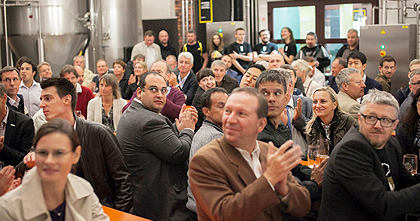Legendarny Schöps powrócił w obecności piwowarów z 6 kontynentów
The wheat symbol of Wrocław returns to the city after 250 years. The premiere took place at the Brewery last weekend. The guests included beer enthusiasts, brewers and technologists from all over the world: Czech Republic, Germany, Austria, France, the Netherlands, Belgium, Denmark, Great Britain and Ireland, Bulgaria, Romania, Macedonia and Croatia, Slovenia, Italy, Switzerland and Portugal. There were visitors from the USA, Uruguay, Venezuela, Australia, South Africa and Japan. The turnout was incredible. The legendary beer worked magic. It’s an event Polish brewing scene hasn’t experienced before.
The first to taste Schöps were the Ambassadors of the project to recreate the beer style representing each district of the city as well as special guests of the EBC Symposium including: Prof. Józef Błażewicz and Prof. Joanna Kawa-Rygielska from the Wrocław University of Life and Environmental Sciences, the head of the first in Poland post-graduate programme in the brewing industry; Prof. Ludwig Narziss from TUM Weihenstephan, the legendary university educating Bavarian brewers established in 1868; Prof. Mogens Larsen Andersen from the University of Copenhagen (established in 1479); Prof. David Cook from University of Nottingham; Dan Griffiths from the London Institute of Brewing & Distilling; Alexandr Mikyška representing the legendary Research Institute of Brewing and Malting (1887), Aleksander Poreda, PhD, from the University of Agriculture in Kraków; Tiago Brandao and John Brauer from The Brewers of Europe, organisers of the EBS Symposium in Wrocław.
What does 400-year-old beer taste like?
Naturally cloudy, Schöps is of dark orange colour. Its sweet smell brings to mind honey. The strong touch of nutmeg is balanced with a slightly acidic aroma in the background. The very first sip releases the beer’s complex malty aroma of caramel, sponge cake, and freshly baked bread, which grows into a honey-nutmeg nectar. There is low bitterness level caused by thermophilic lactic acid bacteria that used to live in the wooden barrels where beer was stored. There is a sour-sweet finish with a longer lasting trace of dry fruit.– says Mateusz Gulej, the head brewer at Browar Stu Mostów, member of the international team responsible for recreating Schöps.
Excellent reception of Schöps
Tremendous effort. Excellent promotion of Poland, Wrocław and Browar Stu Mostów. The project of bringing back the symbol of the city’s 800-year-long brewing traditions follows actions taken by both beer and the city enthusiasts. Schöps is part of the city’s history and identity. And it has come back home again!
More information about the beer style at: https://100mostow.pl/schops
More about the project to recreate the beer style at: – https://100mostow.pl/projekt-schops
Interview: – https://www.youtube.com/watch?v=bLxPeHNm1Oc
A map with places where Schöps is available: – https://100mostow.pl/piwna-mapa
First reviews:
- “Schöps is a symbol of Wrocław. It brought fame to the city and played a great role in the life style and diet of city dwellers. This is the reason why we’re brewing this style. We want to bring Schöps back to the homes of Wrocław dwellers. We want the beer to be brewed here and to be an important part of the city again.” – Arletta Ziemian, Browar Stu Mostów.
- “Good beer, highly drinkable. Many thought it would come out clearer and its nutmeg aroma would be stronger. The smell of bread crumbs and toasted bread with honey was very well received. Great success! Excellent event. It was amazing to talk to so many people about their reception of Schöps and the brewing revolution in their countries” – Łukasz Paluszkiewicz, Schöps Ambassador representing the Psie Pole district.
- “Two Schöps in one sitting is just enough; one pils and pale ale later and three more Schöpses get down easily. This is the beer to be promoted. Great event! Wonderful guests! Still, too little is known about Wrocław and Poland. One visitor from Slovenia was truly shocked with the information that there were 1045 beers brewed in Poland last year” – Maciej Gąd, Schöps Ambassador representing the Old Town district.
- “What an interesting project. Tasty beer; great premiere. The guests were really pleased and were asking about the brewing ingredients. The history of the beer style seemed very inspiring to them. Just like the stories behind beers from Bavaria or London are to us. We can be proud of our legacy” – Kuba Zimny, Schöps Ambassador representing the Old Town district.
- “Schöps was brewed since mid-16th to mid-18th century. Over 200 years it was considered the leading beer of this part of Europe. Its recipe was recreated on the basis of what’s known about the brewing industry back then and the current experience of the best professionals,” says Grzegorz Ziemian, Browar Stu Mostów.
- “Schöps is the most famous beer from Wrocław whose origins go back to the beginnings of the city itself. Brewing was one of the oldest crafts in “the city of beer” as Wrocław used to be called in the Middle Ages. Schöps was widely appreciated as its quality outdistanced that of others. The moment of Schöps’s triumph fell on in the 18th century. The record of this sweet nutmeg aroma can be traced back to numerous historical sources. A Silesian chronicler Friedrich Lucae stated in his work Schlesische curiose Merkwürdigkeiten (1689) that Schöps “nurtures the whole city.” In 1611 Elias Freudenberg, a poet and chronicler of Wrocław, mentioned: “Nothing like the beer can be found in the whole country. It’s pleasant to taste and leaves you full and satisfied.”– Grzegorz Sobel (PhD, University of Wrocław) – a historian and expert in traditional cuisine of Wrocław; author of numerous publications on Wrocław’s culinary customs and traditions.
- “As craft beers, and in particular strongly hoppy IPA styles, enjoy increasing popularity, I believe it is important to go back to beers that used to be brewed by our ancestors. Those included low alcohol content beers ideal to quench thirst as well as rich beers recommended by doctors for medical purposes. One of such unforgettable beer styles is a strong wheat beer style brewed in Wrocław known as “The Wrocław Ram.” Today Browar Stu Mostów has taken the challenge to recreate a true legend. This Wrocław-based beer enjoyed great popularity not only in the Polish Kingdom. I’m pleased to be part of this project as it’s of a great importance to me. I’ve been researching the history of the Wrocław brewing industry for years, and honestly the history starts with Schöps.” – writes Andrzej Urbanek, our partner, expert in brewing industry and the history of Wrocław breweries, who has been doing research on forsaken beer styles in the archives of Lower Silesia and Germany.


